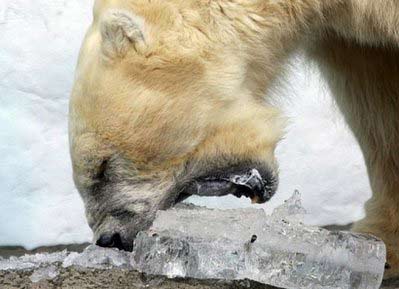 |
|
A polar bear opens his mouth wide to bite a large ice block which contains food at Tokyo's Ueno Zoo in 2007.(Agencies) |
|
Officials in a remote Russian city have drawn up a list of practical tips for locals on how to survive encounters with bears, after growing numbers have wandered into the streets in search of food. The officials in the city of Syktyvkar in the northern Komi republic drew up the guidelines, to be distributed on Wednesday, after several bears were spotted in the city, starving after a heatwave shrivelled nuts and berries. The guide warns that residents should stay calm and stand still if they meet a bear. "Speak to the bear in a firm voice" and "Don't turn your back on it," it adds. In the worst-case scenario, if the bear attacks, the victim should behave aggressively, the guide says. "Shout angrily at it and look it straight in the eyes," it advises. "Bears have started coming into residential areas more and more often," the city authorities of Komi's regional capital of Syktyvkar said in a statement. "Any encounter with a bear is unsafe for humans, so our task is to do all we can to prevent accidents." In September, a bear mauled a 25-year-old man in a central street of the city, wounding him in the neck before he managed to flee, police said. "Three or four civilian encounters with brown bears have been registered," the deputy head of the hunting department in the regional agriculture ministry, Alexander Arkhipenko, told the reporters. Police shot one bear after it wounded a man close to an infants' school in a city suburb, Arkhipenko said. Officials have asked police to patrol streets close to wooded areas in the evenings. Syktyvkar is the regional capital of the remote Komi region in northwest Russia. Its population is just over 230,000. (Read by Nelly Min. Nelly Min is a journalist at the China Daily Website.) (Agencies) |
俄羅斯某邊遠(yuǎn)城市政府向當(dāng)?shù)鼐用癜l(fā)布了一份“遇熊逃生指南”,因?yàn)樽罱欢螘r(shí)間越來(lái)越多的熊走上街頭覓食。 位于俄羅斯科米共和國(guó)北部的瑟克特夫卡爾市官員起草的這份指南于本周三公布。由于今夏酷熱導(dǎo)致堅(jiān)果、漿果等食物減產(chǎn),近期該市熊出沒(méi)頻繁。 該指南提醒居民稱,遇到熊后應(yīng)保持鎮(zhèn)定、站立不動(dòng),“以沉著的口吻與熊對(duì)話”,而且“不要背對(duì)著它們”。 該指南建議,當(dāng)遭遇被熊攻擊這一最壞情況時(shí),受害者應(yīng)表現(xiàn)出攻擊性,“憤怒地沖熊大喊,并直視它的眼睛”。 科米共和國(guó)首府瑟克特夫卡爾市政府在一份聲明中稱,“熊在居民區(qū)的出沒(méi)越來(lái)越頻繁。對(duì)人們來(lái)說(shuō),只要遇到熊就不安全。所以我們的任務(wù)就是竭盡所能防止事故發(fā)生。” 警方表示,今年九月份,一只熊在市中心街道襲擊了一位25歲的男子,該男子脖子被熊打傷,后來(lái)成功逃脫。 當(dāng)?shù)剞r(nóng)業(yè)部門狩獵處副主任亞歷山大?阿爾希片科對(duì)記者表示:“已登記有三四名市民遇到棕熊的事故。” 阿爾希片科還表示,警方開(kāi)槍射殺了一只在市郊幼兒園附近咬傷一名男子的熊。當(dāng)?shù)毓賳T已部署警力每晚在林區(qū)附近街道巡邏。 瑟克特夫卡爾市是俄羅斯西北部偏遠(yuǎn)的科米共和國(guó)首府,人口略多于23萬(wàn)。 相關(guān)閱讀 (中國(guó)日?qǐng)?bào)網(wǎng)英語(yǔ)點(diǎn)津 實(shí)習(xí)生秦華江 編輯 Julie) |
|
Vocabulary: shrivel: to make or become shrunken and withered(枯萎,干枯,皺縮) |
